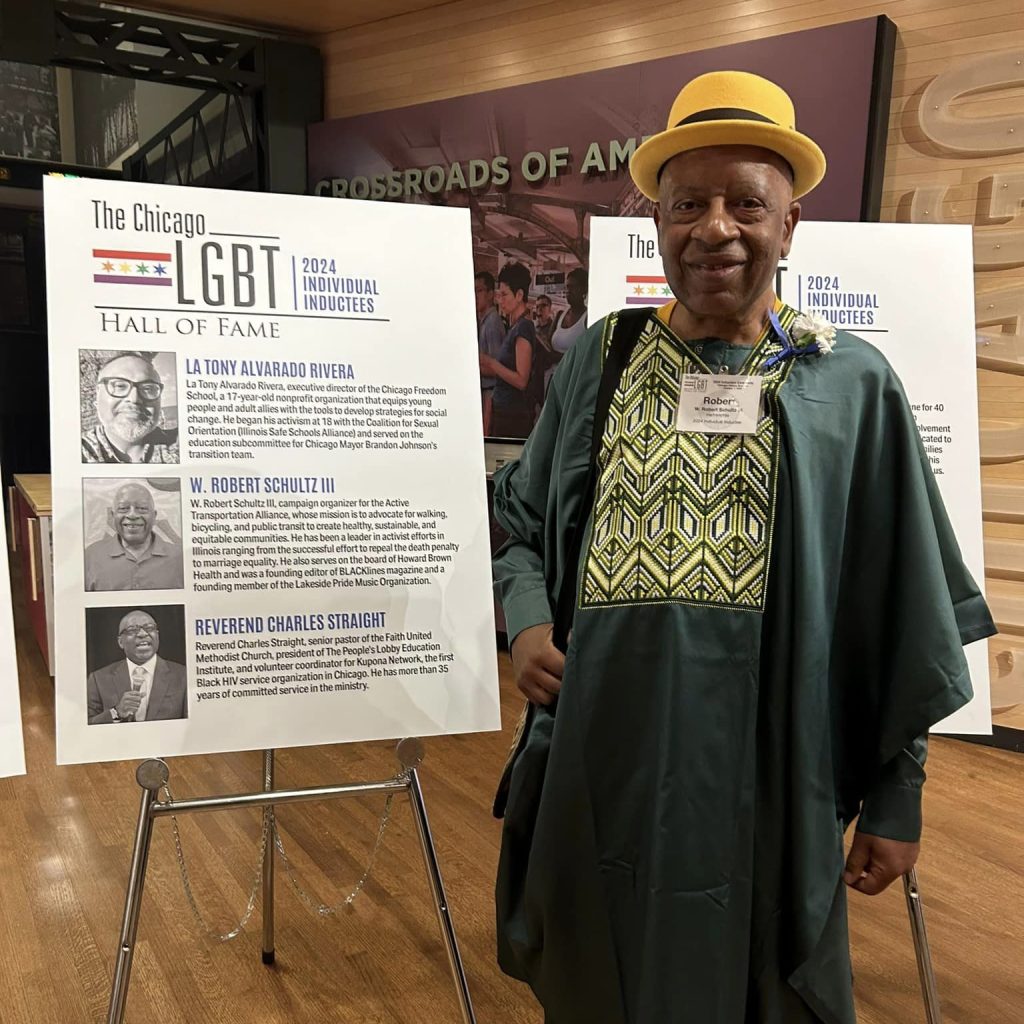W. Robert Schultz III has been a powerful force for activism in Illinois for decades. His efforts have championed critical causes, including marriage equality, the abolition of the death penalty, and the protection of immigrant rights, and his work has not gone unnoticed.
And for the past 6 years, as a campaign organizer for the Active Transportation Alliance, he’s been an important voice in the region for better access to walking, biking, and transit.
Schultz earned a political science degree from Alma College in Michigan before obtaining his law degree from North Carolina Central University, a historically black institution. In 1997, he co-founded the Lakeside Pride Music Organization with four other LGBT musicians and has participated in its drumline ever since.
This October, the long-time activist was inducted into Chicago’s LGBT Hall of Fame, a well-deserved recognition of his lifelong dedication to equality and justice.
We had the opportunity to sit down with Robert to discuss his work, the lessons he’s learned throughout his journey, and his hopes for the future.
What was your first reaction when you learned you were going to be inducted into Chicago’s LGBT Hall of Fame? What does this recognition mean to you?
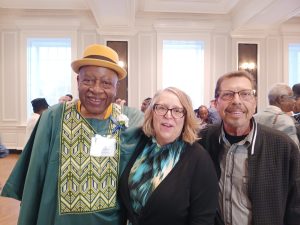 Robert: This is actually the third time I’ve been nominated. About 48 hours before it became public knowledge, I got a call that said, I made it this time.
Robert: This is actually the third time I’ve been nominated. About 48 hours before it became public knowledge, I got a call that said, I made it this time.
But truth be told, it’s sort of the third exciting thing that has happened within the last year.
About a year ago, I was inducted into the first Hall of Fame of my college fraternity — a local fraternity called Zeta Sigma at Alma College in central Michigan — for some of the work I’ve done in Chicago, in Michigan, and in other places.
And then a scholarship announcement came from Howard Brown Health. So, it’s been an exciting 12-to-18-month period.
[In the image above, Robert is shown alongside ATA Executive Director Amy Rynell and Chris Havnoonian on the night of his induction into Chicago’s LGBT Hall of Fame.]
Congratulations on all accounts! What is the Howard Brown scholarship?
Robert: It’s called the W. Robert Schultz III Transportation Fund. It’s essentially a transportation fund that supports people who are unable to afford the cost of going to a medical appointment. So, it removes the barrier of those costs.
Howard Brown is one of the nation’s largest LGBTQ+ organizations, offering primary care, behavioral health, and social services at 10 clinics across Chicago. I served on the board of Howard Brown for the maximum length of nine years.
Just before my last meeting, someone told me they were going to establish a transportation fund in my name. I call this “being invited to your own surprise party.” [laughs]
What are some of the projects or initiatives you’ve worked on that you’re most proud of?
Robert: It’s hard to really decide, but I think there’s three big things that I’m very proud of.
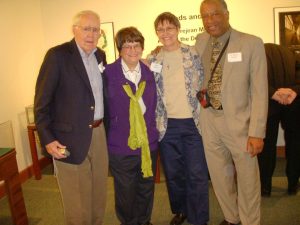
One is my work in Michigan during the Immigration Reform and Control Act. I worked with nearly 800 migrant workers and other people in West Michigan to get their green cards. That work made me very sensitive to the issues immigrants face.
And then working on abolishing the death penalty in Illinois was very important and exciting, and it took me around the state. I worked with people who have been wrongly convicted, and we did two speaking tours around the state.
[The image on the left features Robert (on the right) with Sister Helen Prejean (second from left), a prominent advocate for the abolition of the death penalty.]
The third big thing that I am proud of is a building in the Medical 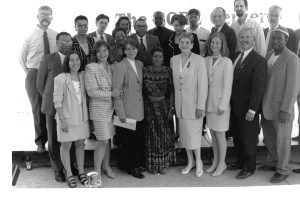 District called the Ruth Rothstein CORE Center for HIV and infectious diseases. When I moved to Chicago in 1990, AIDS was already a major concern and there was a lot of interest in how to respond to it. I became involved with the team putting together a clinic. [Since its opening, the Center has remained one of the largest HIV/AIDS clinics in the U.S. and treats more than 10,000 patients annually for HIV/AIDS care and other infectious diseases.]
District called the Ruth Rothstein CORE Center for HIV and infectious diseases. When I moved to Chicago in 1990, AIDS was already a major concern and there was a lot of interest in how to respond to it. I became involved with the team putting together a clinic. [Since its opening, the Center has remained one of the largest HIV/AIDS clinics in the U.S. and treats more than 10,000 patients annually for HIV/AIDS care and other infectious diseases.]
I was the head of the community advisory board, working with other community members on providing input for the design and operation of the center. Near the end of the construction period, I got to sign the final girder to be erected into the infrastructure of the building, along with a lot of other people.
[The image on the right shows Robert (middle row, far left) with the team from the Ruth Rothstein CORE Center.]
Was there a pivotal moment or event that motivated you to become an advocate for these issues?
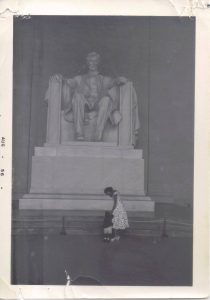 Robert: I’m a civil rights diaper baby. I was born in the South. My parents were in Kentucky, which was segregated. My dad was the first African American to attend pharmacy school in the state of Kentucky, and he’s in the African American Hall of Fame for Kentuckians because of that.
Robert: I’m a civil rights diaper baby. I was born in the South. My parents were in Kentucky, which was segregated. My dad was the first African American to attend pharmacy school in the state of Kentucky, and he’s in the African American Hall of Fame for Kentuckians because of that.
My parents’ high school teacher was a civil rights leader in Louisville. He encouraged a lot of his students to get involved, and so did my parents.
Brown v. Board of Education was decided just before I was born. My dad had a laminated copy of the African American newspaper that announced the decision of Brown v. Board of Education, and it always had a prominent space in our home on the wall.
There was also an amusement park in our neighborhood in Louisville, Kentucky that I was aware that we couldn’t attend as African Americans. And I have a big memory of seeing Martin Luther King when I was around five or six.
[In the image above, Robert visits Washington, D.C., for the first time at 18 months old.]
How do the social justice issues you have worked on intersect with current transportation issues?
Robert: Well, it wasn’t until I worked with Amnesty International that I found an umbrella to bring all of this together. At Amnesty, I began talking about the Universal Declaration of Human Rights — the right to transportation is part of that, as well as the right to health care, the right to recreation, the right to work and earn a living.
So, I tried to talk about human rights in each of these contexts. In the healthcare context, people talk about social determinants. At the Active Transportation Alliance, we talk about speed limits and fare integration and a lot of technical stuff. But when you rise above all of this, we’re talking about issues of human rights, and they impact a lot of different areas.
The W. Robert Schultz III transportation fund is an example of that. We live in a world where transportation is important, and always has been. People need to get from point A to point B, especially when seeking medical care. So, there’s a natural overlap in the relationship between those.
Your finances, your nutrition, your ability to dress warmly in the wintertime and coolly in the summertime, and decent housing, all of those are social determinants of health, and so is the ability to get to your medical appointment. All those relate, and they all should be considered human rights.
At the Active Transportation Alliance, I’ve been able to put that into practice by connecting elected officials, and agency staff with Active Transportation Alliance members and people from Chicago communities who might not otherwise have a voice in transportation decisions. I hope through that work we will help move Chicago along the path of greater sustainability, health, and equity in the mobility sphere.
Looking back at many years of advocacy, what strategies have you found most effective in creating change?
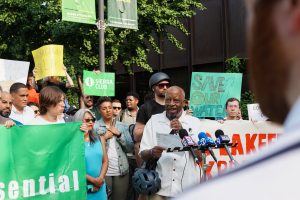 Robert: The most important thing is to work with people, and to find people where they’re at, encouraging them to get involved, showing them that there’s a reason to get involved.
Robert: The most important thing is to work with people, and to find people where they’re at, encouraging them to get involved, showing them that there’s a reason to get involved.
I’m very thankful that I’ve been able to find people who are willing to step up and be part of a team and accept me as part of the team. Many of the things I have achieved, I haven’t been able to do just by myself. It was because of other activists that were part of our team.
It’s important to get everyday people involved through a petition or showing up at a meeting, and having conversations with elected officials. Showing them how they can get involved, and giving them hope that because of doing these activities, something will change. Sometimes it takes a while, sometimes it happens quickly.
Helping people relate to a cause is important, too. When we worked on marriage equality, we talked about the importance of loving relationships with people, and how we were denying that to some people. We asked people if they might know someone who would benefit from marriage equality.
While we are working on transportation issues, we try to highlight issues from different perspectives, say a youth perspective or a senior perspective. But with each of these issues, we want to find some way that people can relate to and latch on to the issue.
And even if it doesn’t impact them directly, we want to give them enough information so they feel motivated to take some sort of action.
[The image above captures Robert speaking at the Save the Lakefront Rally in August 2024.]
Is there a message that you hope people take away from your story?
Robert: I feel like there’s still some things worth fighting for, and we still have a long way to go to make the world as we would like to see it.
The work we do at the Active Transportation Alliance cuts in a lot of different ways. We’re trying to make the world more sustainable by encouraging people not to rely on cars, and instead use other ways of getting around — walking, biking, public transit. It’s healthier to do those things. And it also creates a community.
Working on transportation has become my capstone project, if you will. Hopefully, we can lay the groundwork so that 10, 20, 30 years from now, there will be an abundance of clean, healthy transportation options. Nothing big is done overnight.
—————
In 2025, Robert will be turning 70 years old. This joyous occasion coincides not only with his 35th year of living in Chicago but also with the 40th anniversary of the Active Transportation Alliance and the 50th anniversary of Howard Brown Health. In honor of this fourfold celebration, Robert is launching a year-long campaign to raise $10,000 for the transportation fund at Howard Brown Health. If you would like to support his efforts, you can find his donation page here.

